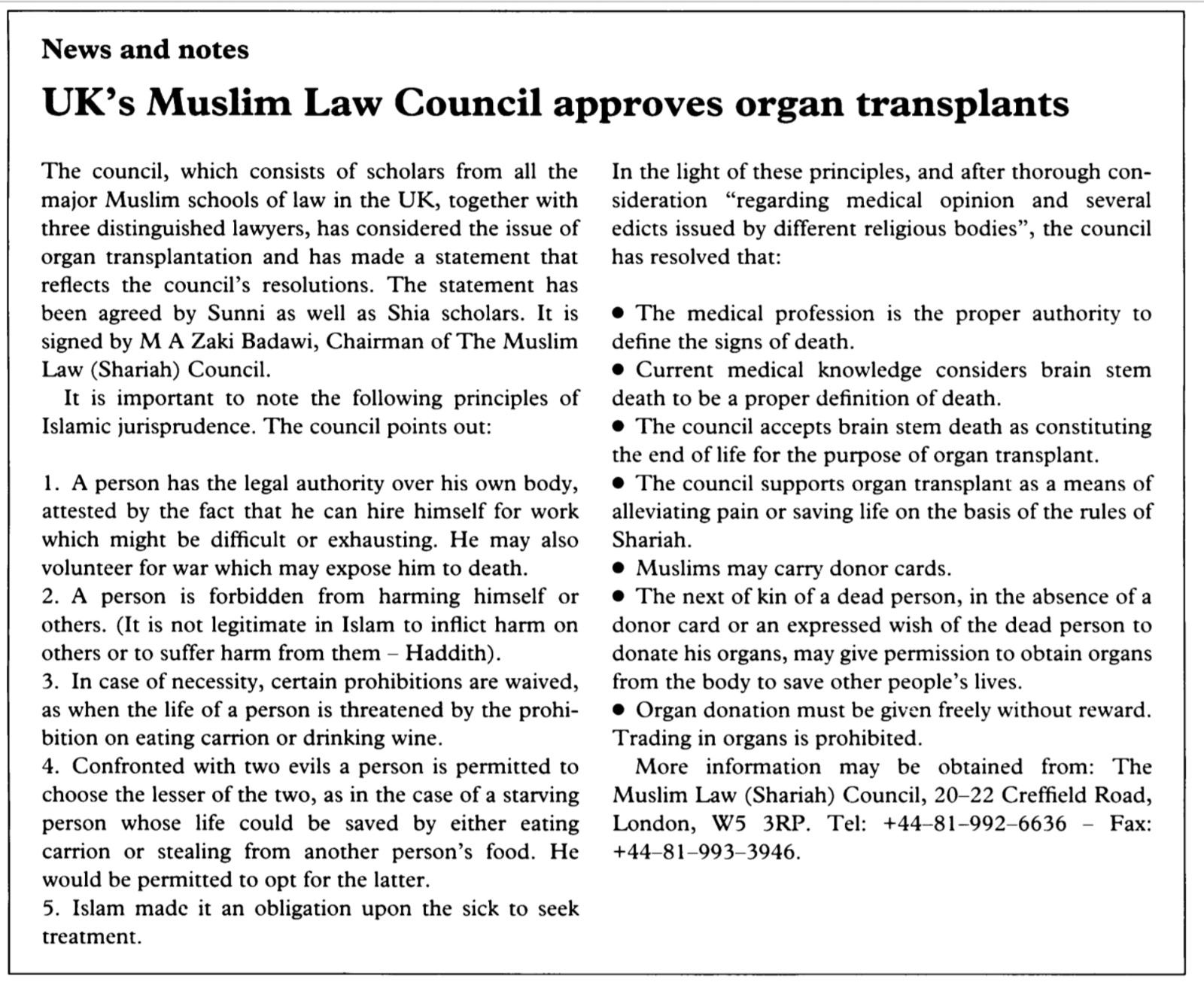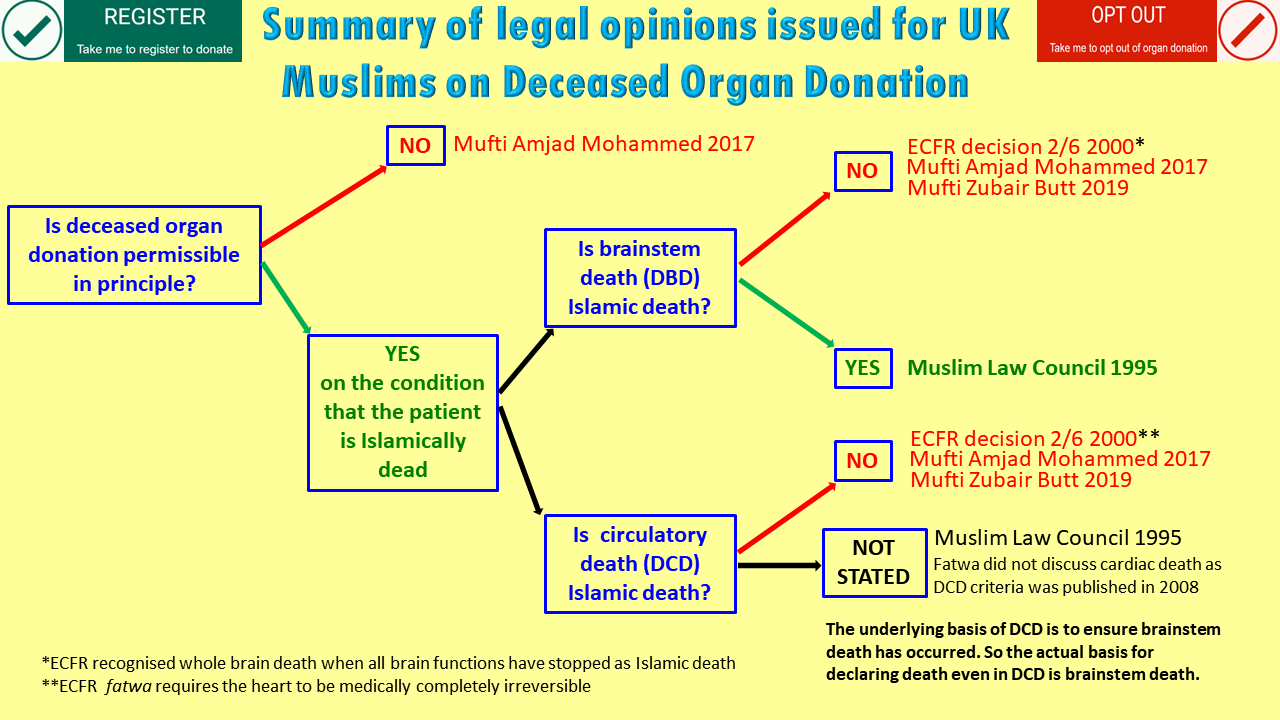بِسۡمِ اللهِ الرَّحۡمٰنِ الرَّحِيۡمِ
Introduction
The discourse surrounding organ donation within Islāmic jurisprudence and medicine is complex, characterized by a plethora of terminologies that, when "translated" into plain English for the average person, may induce confusion and give rise to seemingly contradictory legal opinions. Furthermore, targeted campaigns and educational initiatives directed at the Muslim populace in the U.K. often lack transparency, presenting a skewed narrative aimed primarily at promoting organ donation rather than providing a comprehensive and unbiased overview of the situation. Consequently, individuals may encounter conflicting narratives from these campaigns and their religious scholars, fostering confusion, suspicion, and mistrust within the community.
Maintaining public trust is paramount in the realm of organ donation, as the entire enterprise hinges upon the confidence of the populace. This underscores the importance of transparency and dissemination of complete truths rather than selective information. While acknowledging that medical professionals may not possess all the answers, the imperative remains to act in the best interest of patients and the community, thereby safeguarding public trust for long-term success. In Islāmic doctrine, while health holds significance, it is but one facet among many goods, contrasting with its elevated status in contemporary society.
Muslim individuals place their trust in Muslim doctors to furnish them with relevant information conducive to making informed decisions regarding organ donation. In Islām, sincere intention is essential as is correct methodology. Unfortunately, the discourse on this emotive topic has become polarized in certain Muslim circles. Thus, it is imperative to provide comprehensive information to the Muslim public, allowing each individual to discern what aligns best with their spiritual journey. Emphasis is often placed on the rulings of Muslim scholars rather than medical professionals, emphasizing the importance for Muslim doctors to be well-versed in Islāmic jurisprudence on the subject.
Queries regarding the permissibility of the removal of organs from deceased bodies may elicit different responses, highlighting the need for nuanced consideration of the applicability of fatawa to specific clinical scenarios.
FAQs on Deceased Organ Donation in Islām
Q1: What is the Islāmic ruling concerning the removal of organs from a deceased person? Is it ḥalāl (permissible) or ḥarām (forbidden)?
A 1: According to Islāmic jurisprudence, the removal of organs from a deceased individual is universally considered ḥarām (forbidden), constituting the default position. However, certain exceptions exist under specific circumstances, as elaborated below.
Q 2: Is it permissible to donate organs after death?
A 2: Yes, the permissibility of deceased organ donation is contingent upon various conditions, as indicated by numerous Muslim jurists. Two primary arguments for permissibility stem from theological necessity (ḍarūrah) and public benefit (maslaha). Some scholars not only permit deceased organ donation but advocate it as recommended or as highly recommend, viewing it as a form of ongoing charity (sadaqa jariya) with the potential to save lives. Consequently, the decision to donate organs entails balancing the risks of harm from an Islāmic standpoint against potential benefits, constitute the essence of the debate. Alternatively, the potential loss of life while awaiting organ transplantation may also be viewed as harm versus potential benefits for the recipient. Within Islām, the principle of preventing harm takes precedence over acquiring benefits. The permissibility of end-of-life organ donation is therefore conditional; see A5 and A6 below for further details.
Q 3: Should I opt-in or opt-out of the NHS organ donation system in the UK?
A 3: If the conditions for permissibility outlined in A6 are met, and one adheres to the rulings of Muslim jurists who endorse deceased organ donation, then registering the decision to donate organs after death is permissible. Conversely, if one follows the rulings of scholars who consider deceased organ donation as ḥarām, then registering the decision not to donate organs is advised. Failure to register a decision implies a presumption in favour of organ donation. Specific questions pertaining to the new opt-out organ donation system (Max and Keira's Law) are here.
Q 4: Is there a divergence among the different Islāmic schools of thought regarding deceased organ donation?
A 4: There appears to be. Ḥanafī jurists, particularly those from the Indo-Pak region, generally deem deceased organ donation impermissible (ḥarām). This stance is elucidated in a video by Shaikh M. Ibrahim and underscored by Mufti Amjad Mohammed, and has garnered support from over 50 UK-based Muslim scholars, primarily affiliated with Wifaq-ul-ulema. Scholars from the Middle East present differing viewpoints on deceased organ donation compared to Ḥanafī jurists.
Q 5: What are the conditions insisted upon by Muslim jurists who consider deceased organ donation as permissible?
A 5: Besides consent of the donor or his next of kin, the following three conditions are necessary:
i) Necessity from an Islāmic Law Perspective: A need must exist that cannot be fulfilled by alternative means. The application of the principle "Necessities overrule prohibitions" is determined by Muslim jurists. However, some may argue that the theological necessity (ḍarūrah) required for deceased organ donation to override prohibitions may not be attained.
ii) Capability of Fulfilling the Need: The donated organ must be capable of fulfilling the identified need.
iii) Islāmic Death of the Donor: The donor must be deemed Islāmically dead.
Q 6: Are all the conditions for organ donation permissibility from the deceased (as outlined in A5 above) met in the UK?
A 6:
i) Is condition 1 met?: Yes, there is undoubtedly a need, although whether it reaches the theological necessity (ḍarūrah) level is subject to juristic determination. The UK faces a global organ shortage, with over-representation of the UK Asian community on the transplant list and under-representation on the donor register, leading to extended waiting times, particularly for Asian and Muslim patients.
ii) Is condition 2 met?: Yes. Organ donation would fulfil the needs of those awaiting transplantation.
iii) Is condition 3 met?: Uncertain. The equivalence of brainstem death (DBD) and controlled circulatory death (DCD) in the UK with Islāmic death (Shari death) is debated. Variation in the criteria for declaring DBD and DCD worldwide complicates matters, although the UK's National Health Service (NHS) ensures consistency in practice. However, differences persist among Muslim scholars regarding whether DBD and DCD criteria align with Islāmic death. According to Mufti Zubair Butt in his 2019 fatwa, brain death and controlled circulatory death do not constitute Islāmic death.

Q 7 What are the legal rulings (fatāwa) on organ donation issued for UK Muslims?
A 7: Four fatāwa/ legal opinions have been issued for UK Muslims regarding organ donation:
- 1995: Muslim Law Council fatwa
- 2000: European Council for Fatwa and Research (ECFR) Decision 2/6 (in Arabic)
- 2017: "Harvesting the Human: Traditional Sunni Islāmic Perspective" by Mufti Amjad Mohammed
- 2019: "Organ Donation and Transplantation in Islām, An Opinion" by Mufti M. Zubair Butt

Of the 4 documented fatāwa (legal rulings) for U.K. Muslims 3 out of these 4 fatāwa do not consider brainstem death to be Islamic death. So from their perspective, the question that arises is: "Is deceased organ donation actually living organ donation?".
Q 8: Does Mufti Zubair Butt approve deceased organ donation for all organs except the gonads as claimed on a web site?
A 8: No, this claim is based on a misunderstanding and misrepresentation of Mufti Zubair Butt's fatwa. While he permits deceased organ donation in principle, he does not consider organ donors, both brainstem death (DBD) and controlled circulatory death (DCD), to be Islāmically dead because in both situations the heart has not stopped beating irreversibly.
Q 9: Is it possible to declare someone legally dead when they are not actually dead?
A 9: Yes, legal death does not always align with actual death, and definitions of legal death vary globally. Debate persists over whether brain death and brief cessation of circulation constitute actual death, leading some experts to question the Dead Donor Rule. Legal cases in the UK have upheld brainstem death as legal death, but the debate continues due to the absence of an absolute definition of death.
Q10. Do certain Muslim jurists consider brain death equivalent to Islāmic death?
A10. Yes, some Muslim jurists, like Shaikh Yasin, proposed equating brain death with Islāmic death during the 1980s at an Islāmic Fiqh Academy meeting. He argued that in the absence of explicit scriptural indications of the soul's departure from the body, reliance on medical expertise is warranted. Thus, according to Shaikh Yasin, a brain-dead individual lacking volitional activity or sensation signifies the departure of the soul. However, arguments against these propositions, including objections from Shaikh Tawfeeq al-Wai of Jordan, contest presumptions linking loss of consciousness or voluntary motion with soul departure. Western academics have also debated defining death as a permanent loss of higher brain function, a proposal rejected by the President's Commission on the Determination of Death in 1981. Challenges persist in distinguishing between dying (a process) and actual death (an irreversible biological event). Recent contributions from scholars like Shaikh Dr. Rashid has postulated that permanent loss of higher brain function satisfies Islāmic death criteria. He has also opined with detailed arguments that even though brain death is not actual death it is still permissible to retrieve organs for transplantation from individuals declared brain dead.
Q11. When is it permissible to remove organs if determining the exact time of death is impossible?
A11. Muslim jurists, predominantly Hanafi, who deem organ removal from a deceased body impermissible, challenge the current timings used for organ retrieval in contexts where it's deemed medically acceptable. Determining the precise moment of soul departure from the body is beyond human capability, as the nature of the soul remains unknown. Nevertheless, for organ donation purposes, timing becomes critical, necessitating collaboration between jurists and medical experts to establish when irreversible heart cessation occurs, ensuring no conceivable medical intervention could restart the heart. This may require an extended period, perhaps around four hours, after which most organs become unsuitable for transplantation. However, corneas and tissues remain viable for donation, providing an option for donors to opt for this during registration. Presently, technology precludes achieving death based on irreversible heart cessation while maintaining viable organs.
Q12. Why can dialysis not be used for for life by kidney failure patients ?
A12. Dialysis offers palliative, not curative, treatment for end-stage kidney failure. Kidney transplantation, superior in quality of life and longevity, proves more cost-effective than long-term dialysis. A donated kidney typically lasts 10-12 years, while dialysis over a decade incurs much higher costs. With a considerable number of patients awaiting kidney transplants, transplantation emerges as the financially prudent option.
Q13. What measures could facilitate Muslim jurists in permitting deceased organ donation for U.K. Muslims?
A13. Education emerges as a crucial factor, fostering understanding of organ donation processes and prompting revisions or new fatawa aligning with current medical practices. Criteria for brainstem and whole-brain death must reflect contemporary medical realities, acknowledging that these states do not entail the complete cessation of brain function nor brain degeneration, as stipulated in some fatawa. While uncertainties persist regarding the association of brain death with soul departure, patients deemed brain-dead have reached a stage where further medical intervention proves futile, warranting life support withdrawal. Similarly, patients nearing death, not meeting brain death criteria, also reach a point where life support withdrawal becomes appropriate. Aligning with jurists insisting on irreversible heart cessation as a death criterion presents challenges, as achieving this precludes organ viability. Thus, accepting the impossibility of precisely determining soul departure and acknowledging the inability to obtain viable organs from truly deceased bodies constitutes an essential aspect of addressing the issue from an Islāmic perspective.
Dr. A. Hussain
Related articles by the same author
The New Opt-out Organ Donation Law in U.K.: FAQs
Presumed/ Deemed Consent in Organ Donation
The Dilemma of Brain Death for HCPs
